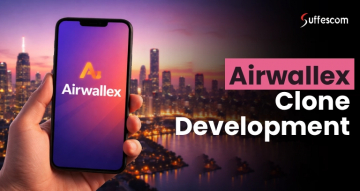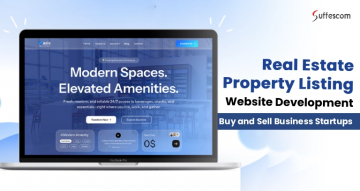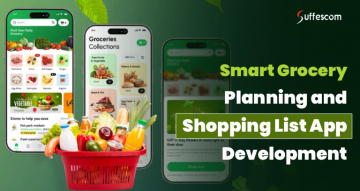AI Trip Planner App Development | Build an AI Trip Planner App
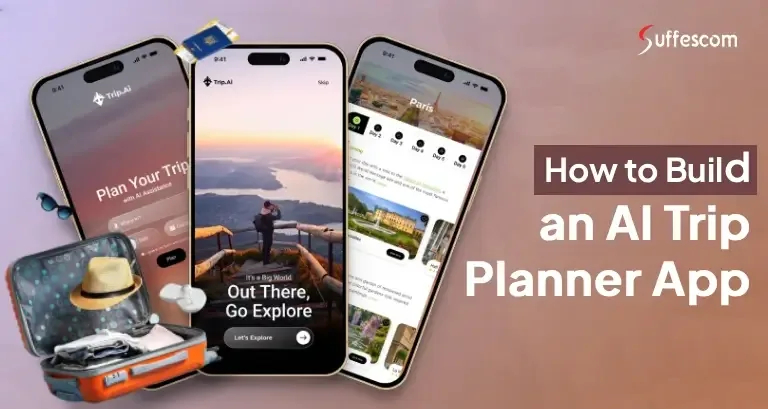
Planning the perfect trip takes hours to do research, and it is tough to manage the travel business with traditional methods. AI-enabled trip planner tool helps businesses to manage the user base, travel history, automate payment management, trip planners payroll management and tour guide behaviour track. Moreover, travellers also expect systemized experiences customized to their preferences, budgets, suggest personalized itineraries, trip offers, and real-time conditions. With the growing demand for smart travel, businesses are turning to AI development services to build platforms that simplify itinerary creation, route suggestions, and customer engagement.
Consider an AI trip planner, it's a innovative and automated solution. It transforms the way people plan and manage trips. Using AI in trip planning helps businesses meet rising customer expectations and improve internal workflows.
The global AI travel market is projected to grow from approximately US $785 million to over US$8.1 billion by 2030, representing a massive expansion across platforms and services. In this blog, we’ll explore how to build an AI-powered trip planner app, the core features it must include, the tech stack behind it, and why it’s becoming a must-have solution for travel businesses, agencies, and platforms aiming to stay ahead of the curve.
What Is an AI Trip Planner?
An AI travel planner app is an intelligent platform that uses artificial intelligence to design personalized itineraries based on user preferences, budget, and behavior.
Unlike traditional planners, it learns from past trips, analyzes real-time data, and automates everything from hotel suggestions to local experiences.
Traditional Trip Planning vs AI Trip Planning
| Aspect | Traditional Trip Planning | AI Trip Planner |
| Research Time | Manual searching | Automated itinerary creation |
| Personalization | Limited | Hyper-personalized |
| Updates | Static | Real-time changes |
| Cost Optimization | Manual comparison | Predictive price insights |
Launch Your AI-Powered Trip Planning App Today
Ready to deliver hyper-personalized travel experiences? We help you build a scalable, intelligent AI-powered trip planning app tailored for modern travellers and tour operators.
Why Travel Businesses Are Investing in AI-Powered Trip Planning Apps?
Travel businesses are rapidly shifting toward AI trip planning app features for businesses that streamline operations, improve customer engagement, and increase ROI.
1. Rising Demand for Personalized Travel
Modern travellers want to get personalized experiences. AI helps businesses to customize the itineraries. This gives higher satisfaction by offering real-time user behaviour and preferences.
2. Improved Customer Retention
With AI travel planner for agencies, your app learns from every customer interaction and delivers smarter recommendations each time, encouraging repeat bookings.
3. Optimized Resource Planning
AI-powered demand forecasting, which allows businesses to plan for staff, inventory, and pricing strategies. It ensures operational readiness for high and low seasons, as well as all travel periods.
4. Data-Driven Decision Making
AI trip planning apps consider real-time and historical travel patterns. This enables them to predict trends, maximize inventory, and businesses by refining marketing, price, and inventory strategies.
5. Ready to Scale Globally
AI travel apps are built to handle large user volumes and adapt across languages and regions. Whether you're targeting solo travellers or enterprise partners, scalability is built right in.
6. Automation & Cost Savings
AI automates repetitive manual tasks like itinerary management, comparing prices, and route planning. This means a reduction in operational errors, acceleration of workflows, and savings in operational costs.
7. New Revenue Streams & Monetization Opportunities
Affiliate marketing, sponsored packages, and white-label AI travel solutions are ways in which businesses can unlock new income channels. AI also helps in upselling experiences by learning from user behaviour, thus creating personalized offers that convert better.
8. Competitive Advantage and Differentiation
AI-powered personalization helps brands to stand out in the travel tech market. Therein lies a competitive edge to be able to recommend trips based on real-time behavior and preferences.
9. Fulfills Traveller Expectations
Today's travellers want more than convenience; they want connection. AI makes travel interactive and fluid, offering real-time updates, voice assistance, and adaptive itineraries that align perfectly with each traveller's lifestyle.
Key Features of a Powerful AI Trip Planning App
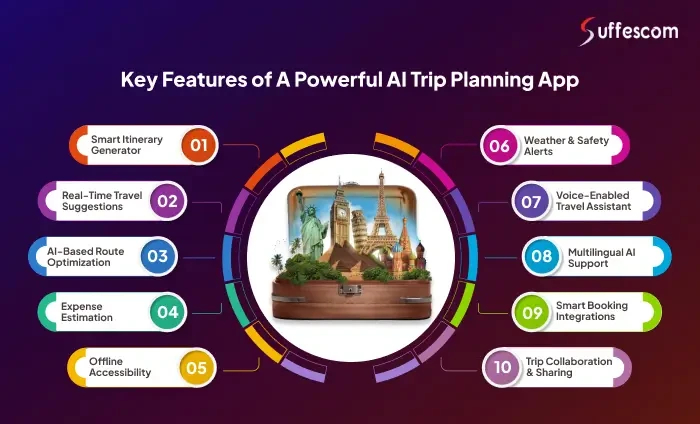
By integrating all these intelligent features, businesses can offer a highly personalized, efficient, and scalable travel experience. It positions the platform as a next-gen AI-powered trip planning solution:
a. User-Facing Features
1. Smart Itinerary Generator
An AI-powered itinerary builder dynamically offers personalized travel plans based on preferences, trip goals, and historical behaviour. It reduces planning time while enhancing relevance over manual search.
2. Real-Time Travel Suggestions
AI algorithms analyze live data from user preferences, local events, and dynamic pricing to generate contextual travel recommendations. It improves the personalization and increases app stickiness.
3. Expense Estimation & Budget Tracking
AI helps predict trip costs by analyzing live prices and how travelers usually behave. Users can set budgets, get notifications, and access spending insights. It helps platforms build financial trust and loyalty.
4. Voice-Enabled Travel Assistant
Allow users to interact hands-free experience using voice commands to search, adjust plans, or get instant updates. It offers convenience to travellers on the move and elevates app accessibility.
5. Trip Collaboration & Sharing
Enable users to co-plan trips with friends or family. Users can manage their schedule and share their itinerary, which boosts engagement and helps the app get more exposure.
b. Business-Facing Features
1. AI-Based Route Optimization
With the help of AI Agents for Route Optimization, travel apps can instantly analyze live traffic, transit schedules. It provides the best travel routes that reduce the risk of delays and enhance user satisfaction.
2. Smart Booking Integrations
It connects with flights, hotels, car rentals, and local activities to book everything automatically as per your trip plan. It shortens the user journey and improves conversion rates.
3. Demand Forecasting
Helps agencies plan seasonal offers, pricing strategies, and staff allocation.
4. Analytics Dashboard
Visual insights into customer behavior, booking data, and location performance.
c. Platform Features
1. Offline Accessibility
Pre-downloaded itineraries, maps, and key travel data allow uninterrupted access during low or no-connectivity situations. This ensures service continuity and boosts usability across remote travel zones.
2. Weather & Safety Alerts
AI aggregates real-time weather forecasts and safety advisories. It offers proactive alerts on potential disruptions, disasters, or geopolitical risks that ensure traveller safety and business liability coverage.
3. Multilingual AI Support
AI can translate content and support responses into multiple languages, allowing for smooth global reach. It is especially valuable for platforms that target diverse markets.
How to Build an AI Trip Planner App (Step-by-Step)
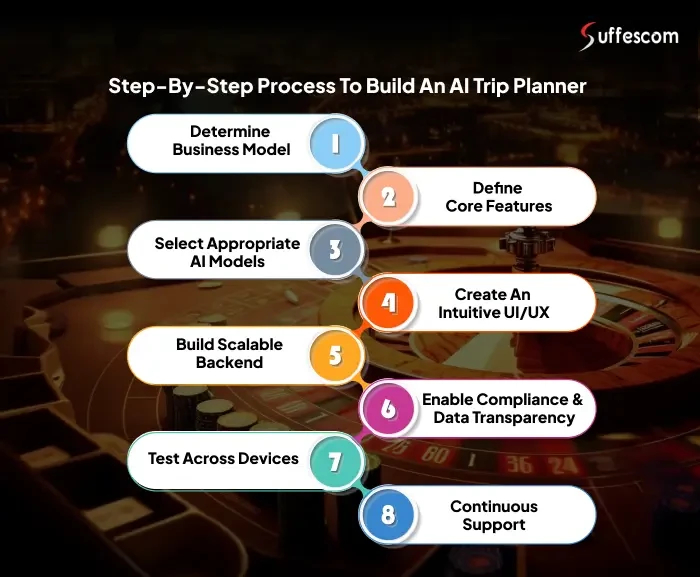
Creating an AI-based trip planning app is a long way from mere itinerary building. It involves a strategic combination of machine learning, real-time data integration, and scalable architecture. Following is a step-by-step guide written especially for companies planning to develop an AI trip planner that will shine in the current competitive digital travel environment:
1. Determine Business Model & Target Audience
Prior to developing your AI trip planner, establish the purpose of your platform. Determine whether your target audience includes independent travelers, corporate clients, or both. Choosing a sustainable business model is also crucial, which includes methods such as subscription, freemium, affiliate, or booking commission. It is based on what suits your audience's behavior and long-term monetization plan.
2. Define Core Features and Travel Use Cases
Describe the features your artificial intelligence travel organizer should have, such as intelligent itinerary creation, in-real-time suggestions, multi-modal navigation, cost tracking, etc. Also, customize your feature set based on your niche, whether you're developing a road trip organizer AI app or an application for corporate travellers.
3. Select AI Models and Inputs
A strong AI trip planning app is based on solid AI algorithms. Utilize Natural Language Processing (NLP) for itinerary comprehension and chat support. It also includes machine learning for customized recommendations and geospatial calculations for best-route plans. Incorporating APIs for trip booking engines, public transportation, and in-destination events creates an intelligent trip experience.
4. Create an Intuitive UI/UX
User experience is a significant contributor to user engagement. Make sure the user interface is smooth. The goal should be to make an AI-driven trip planning app feel like having a personal travel assistant.
5. Build Scalable Backend
Employ cloud-native technologies that facilitate scalability, reliability, and speed. An AI trip planner backend must include high levels of user data, AI model computation, API Integration and third-party travel API calls. A modular architecture also helps in rolling out new features or updates without disruption.
6. Enable Compliance and Data Transparency
Travel apps handle sensitive personal information, including IDs and payment details. Ensure your platform is CCPA and GDPR compliant. Incorporate end-to-end encryption and transparent privacy policies to establish trust and compliance with regulations worldwide.
7. Test Across Devices
Whether you're developing a road trip AI planner or a world itinerary builder, robust testing is essential. Test performance on mobile and web, simulate low-connectivity scenarios, and test AI outputs for reliability. A thoroughly tested application lowers churn and raises retention.
8. Continuous Support
After you develop an AI trip planner, the work doesn't end. Continue refining your AI models with fresh user behaviour inputs and feedback loops. Add seasonal or location-centric features and add integrations as new travel APIs become available. This keeps your AI travel planner competitive and scalable.
What Modern Travellers Expect from AI Trip Planners?
This means that modern travellers are unimpressed by generic travel apps. They want something smarter, faster, and more personalized. AI trip planners meet that expectation in several ways:
1. Custom travel plans instantly:
Customers using a travel app would want it to generate personalized plans, considering their preferences, budget, and reason for traveling, rather than simply showing pre-set options.
2. Seamless booking experiences:
Integration with booking platforms-flights, hotels, and local tours- is a basic expectation today. Travellers want everything in one place, where they can plan, book, and pay without switching between multiple apps.
3. Real-time updates:
Travelers want notifications regarding flight changes, delays, and experiences nearby that fit their mood or weather conditions.
4. Conversational support:
Chat-based or voice-enabled assistants are becoming the norm, letting users naturally plan their trips as if speaking to a travel agent.
5. Data Privacy and Transparency:
While AI learns from the behavior of users, people have become more conscious of their information storage and its utilization. They want to have clear policies in place that are compliant and secure.
Essential Data Sources Behind AI-Driven Trip Planning
Every AI Trip Planning app relies on one thing above everything else: data. No smart algorithm can create personalized, real-time travel plans without correct input. Here's how different data sources work in tandem to make that happen.
1. GDS and NDC for Flights and Fare
Systems like Amadeus, Sabre, and Travelport provide access to global flight data and ticket availability. The newer NDC adds flexibility with dynamic pricing and rich flight content, enabling airlines to offer more personalized fares directly.
2. OTA Integrations for Hotels and Packages
OTAs like Expedia or Booking.com provide real-time accommodation and bundled travel deals. Integrating their APIs allows users to compare and book stays or packages with ease while helping businesses expand their global reach.
3. POI Databases for Local Experiences
Google Places and Foursquare POIs help an AI planner provide recommendations for nearby restaurants, landmarks, and attractions. It takes a static itinerary and turns it into an adaptive travel experience with changes in context.
4. User-Generated Reviews and Social Insights
Authenticity is added by customer reviews from TripAdvisor and Twitter, among other social platforms. AI models analyze this information for sentiment, highlighting quality experiences and suggesting places for improvement, thanks to real traveler feedback.
5. Unified Data Flow for Smarter Planning
These flights, hotels, POIs, and reviews all unite to form the backbone of a smart AI-powered trip planner. Integration drives personalization, accuracy, and scalability, enabling companies to create seamless travel experiences consistently
Recommended Tech Stack for AI Trip Planner Development
A reliable AI travel app needs the right foundation.
| Category | Tools/Frameworks |
| Backend | Node.js, Python (Django/Flask), Express.js |
| Frontend | React.js, Next.js, Vue.js |
| Database | MongoDB, PostgreSQL, Firebase Realtime DB |
| Cloud Hosting & Storage | AWS, Google Cloud, Microsoft Azure |
| Real-time APIs & Communication | Socket.io, Twilio, Firebase Cloud Messaging |
| AI & ML | TensorFlow, OpenAI API, IBM Watson, Google Vertex AI |
| Security Protocols | SSL Encryption, OAuth 2.0, JWT, GDPR Compliance |
| Payment Gateway Integration | Stripe, Razorpay, Braintree |
| DevOps & CI/CD | Docker, Jenkins, Kubernetes, GitHub Actions, Terraform |
These tools allow developers to build an intelligent and scalable AI travel app development service efficiently.
Best AI Trip Planner Apps in 2025
AI trip planning is growing so fast. There are several platforms that are already setting benchmarks by blending smart algorithms with seamless travel experiences. Here are five standout AI-powered trip planner apps in 2025:
1. Google Travel AI
It is Google's travel website that uses its enormous data system includes maps, search, flights, and customer history, to build intelligent, customized trip recommendations. It helps users in finding destinations, planning journeys, and monitoring bookings within a single ecosystem, with AI-powered updates such as weather forecasts, flight delays, and hotel rate monitoring.
2. Hopper
Hopper utilizes machine learning and predictive analytics to accurately predict future flight and hotel costs. It gives suggestions regarding booking at the right time and provides instant alerts. Enabling users to save money while creating optimized travel plans in real-time.
3. TripIt Pro
TripIt Pro uses AI to pull travel plans from confirmation emails and combine them into one clear itinerary. With its Pro version, it provides real-time notifications, seat tracking, and rewards program integration, thus making it a preferred option for business users and frequent travellers.
4. Roam Around
Roam Around uses AI to create bespoke itineraries in an instant. Travellers provide their destination, dates, and interests. In addition, the site generates comprehensive plans with attractions, dining options, and recommended timeframes. It is perfect for first-time visitors.
5. Wonderplan
It offers an attractive AI trip planning experience with integrated travel budgets, intelligent itineraries, and collaborative features. It's designed for solo travellers as well as small groups, supporting joint input while the AI generates optimized plans aligned with cost, distance, and interests.
| App | Key Strength | Ideal For |
| Google Travel | Data integration | Frequent travelers |
| Hopper | Price prediction | Budget travelers |
| TripIt Pro | Email sync | Business travelers |
| Roam Around | Instant itineraries | Casual travelers |
| Wonderplan | Collaborative planning | Group travelers |
Monetization Models for AI Travel Planning Apps
To make your AI Trip Planning App profitable, it's important to design monetization strategies that balance user experience with strong revenue potential.
1. Subscriptions
Begin with a basic version that includes trip planning fundamentals. It provides premium upgrades for enhanced tools like real-time notifications, offline capabilities, or personalized assistance. This strategy finds the balance between user gain and repeat revenue.
2. Affiliate Marketing
By incorporating flight, hotel, and activity booking engines, your app can make a commission on each sale. AI facilitates matching the best offers to users, maximizing both conversion and partner satisfaction.
3. Sponsored Travel Packages
Collaborate with tourist boards, hotels, or experience operators to push bespoke travel packages. With AI targeting, you can present these packages that stimulate user interest and revenue potential.
4. White-Labeling for Travel Agencies
Make your AI trip planner a white-label offering for conventional travel agencies. This creates B2B revenue streams, allowing agencies to digitize their business without starting from scratch.
What is the Cost of Developing a Trip Planner App?
The cost to build an AI trip planner app ranges from $15,000 to $25,000 for most projects. Factors that affect cost:
- Feature complexity (basic MVP app vs. full-scale app)
- AI integration (recommendations vs. predictive analytics)
- API integrations (flights, hotels, weather, events)
- UI/UX customization
- Scalability requirements
A simpler MVP can be done faster and cheaper, while enterprise-grade apps with global integrations lean higher.
Future Trends in AI-Powered Trip Planning
Staying ahead of AI travel trends means building smarter, safer, and more immersive journeys for travellers.
1. Predictive Travel Routing
Next-gen AI model will suggest smarter travel routes as it analyzes weather patterns, historical traffic, and event data. This helps reduce delays and ensures seamless travel experiences.
2. Sustainable Travel Recommendations
Integrating AI can suggest low-carbon transport modes and green travel itineraries. It helps brands to align with global sustainability goals.
3. AR/VR Travel Previews
AI integrated with immersive tech allows travellers to preview destinations, hotels, or experiences through AR/VR before booking. This reduces uncertainty and increases bookings, especially in luxury or experiential travel.
4. Blockchain-Powered Data Security
Integrating AI with blockchain ensures greater transparency, minimizes fraud, and builds stronger trust with users. It’s a future-ready move for compliance where platforms need to handle sensitive travel, ID, and payment data.
5. Hyper-Personalization & Adaptive Itineraries
Apps will adapt itineraries based on real-time data, from flight delays to weather changes, ensuring travelers never face disruptions. Over time, these AI systems will learn user habits and preferences, offering tailor-made experiences that evolve with each trip.
6. Conversational AI & Voice Interfaces
Natural language capabilities will make AI trip planners conversational, guiding travelers through planning and rebooking effortlessly. With voice assistants, users can modify itineraries hands-free, which is making the entire journey more intuitive and accessible.
7. IoT-Integrated Operations
Smart sensors and connected infrastructure will feed data into AI systems, enabling real-time optimization of transport and accommodation. This allows hotels, airports, and transit systems to sync operations seamlessly, creating a smoother and more efficient travel ecosystem.
Future Proof Your Travel Business with an AI Trip Planner
Turn every road trip into a seamless journey with a custom-built road trip planner AI. From real-time routing to smart itineraries, we develop travel apps that users rely on.
Partner with Suffescom for Smart, Scalable AI Trip Planner App Development!
Suffescom is a trusted AI development company known for delivering high-quality, scalable solutions according to your business needs. When you hire AI developer from our team, you gain access to expertise that makes the platform intuitive, performance-driven, and free from critical bugs. Here’s what sets us apart from the competition:
- Tailored AI Solutions
- Smart Travel Features
- Smooth Integrations
- Secure & Compliant
- Ongoing Support
- On-Time Product Delivery
FAQs
1. What type of AI models do you employ in your travel planning app?
We utilize a combination of machine learning, NLP, and recommendation systems. These models are trained to perform itinerary generation, preference prediction, sentiment analysis of reviews, and even live travel disruption alerts.
2. Do you provide post-launch support and maintenance?
Yes, we provide long-term maintenance, bug fixes, AI model tuning, and feature upgrades that ensure your app remains current and high-performing.
3. How secure is the app with regards to user information and compliance?
Our team adheres to industry standards, including GDPR, CCPA, and SOC 2 compliance. We use secure user authentication, permissions control, and API security, as user data is encrypted.
4. How much does it cost to build an AI trip planner app?
The cost typically starts at $15,000 for a basic MVP and can go beyond $25,000 depending on features like smart routing, real-time updates, and personalization. At Suffescom, we give you a clear estimate based on your exact requirements.
5. How long does it take to create the best AI trip planner app?
It usually takes 2 to 5 months to build a quality AI trip planner app. A simpler MVP version can be ready sooner. The timeline depends on feature complexity, integrations, and AI setup. We ensure each stage runs on time with no surprises.
6. How does an AI trip planner app work?
It uses machine learning and NLP to analyze user preferences, travel data, and real-time conditions, then builds custom itineraries.
